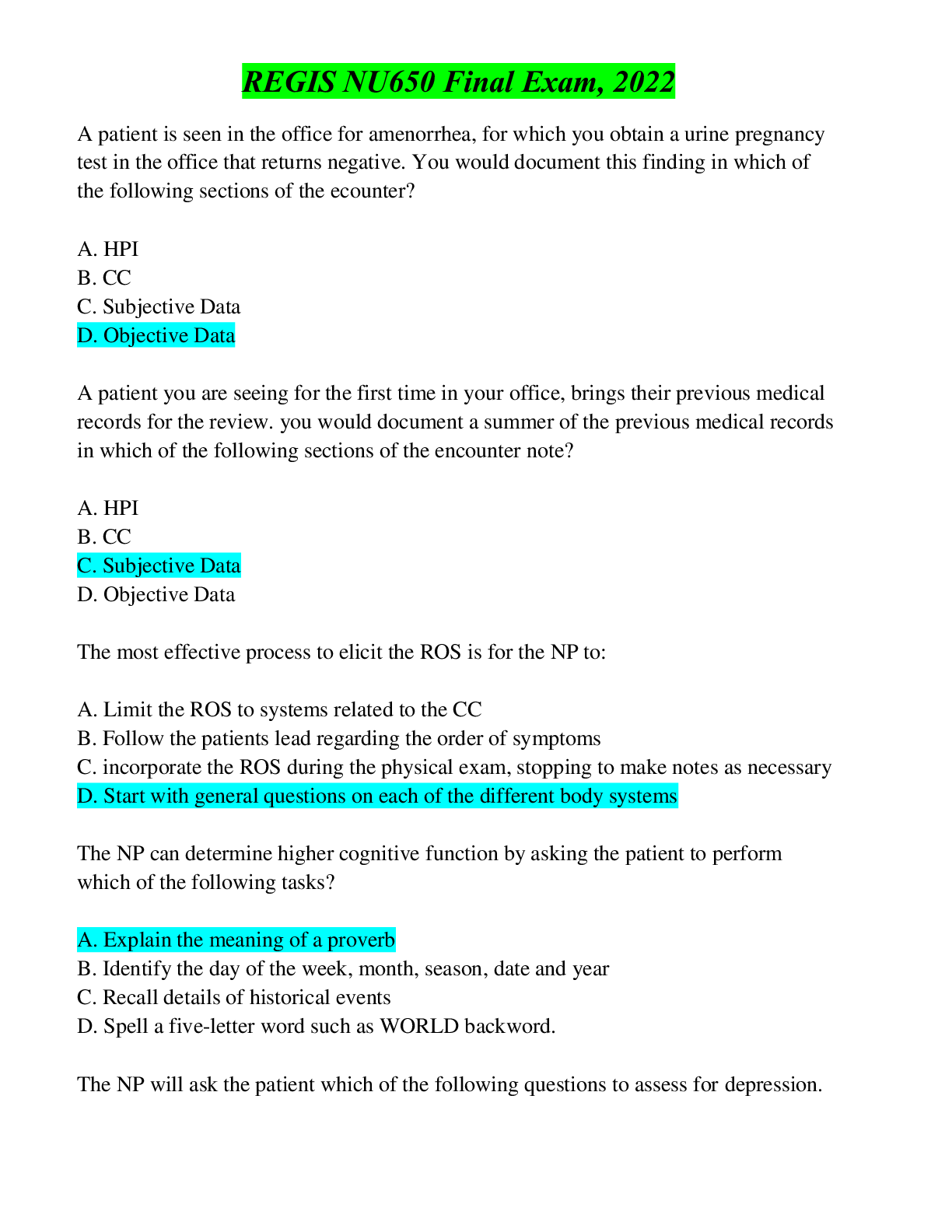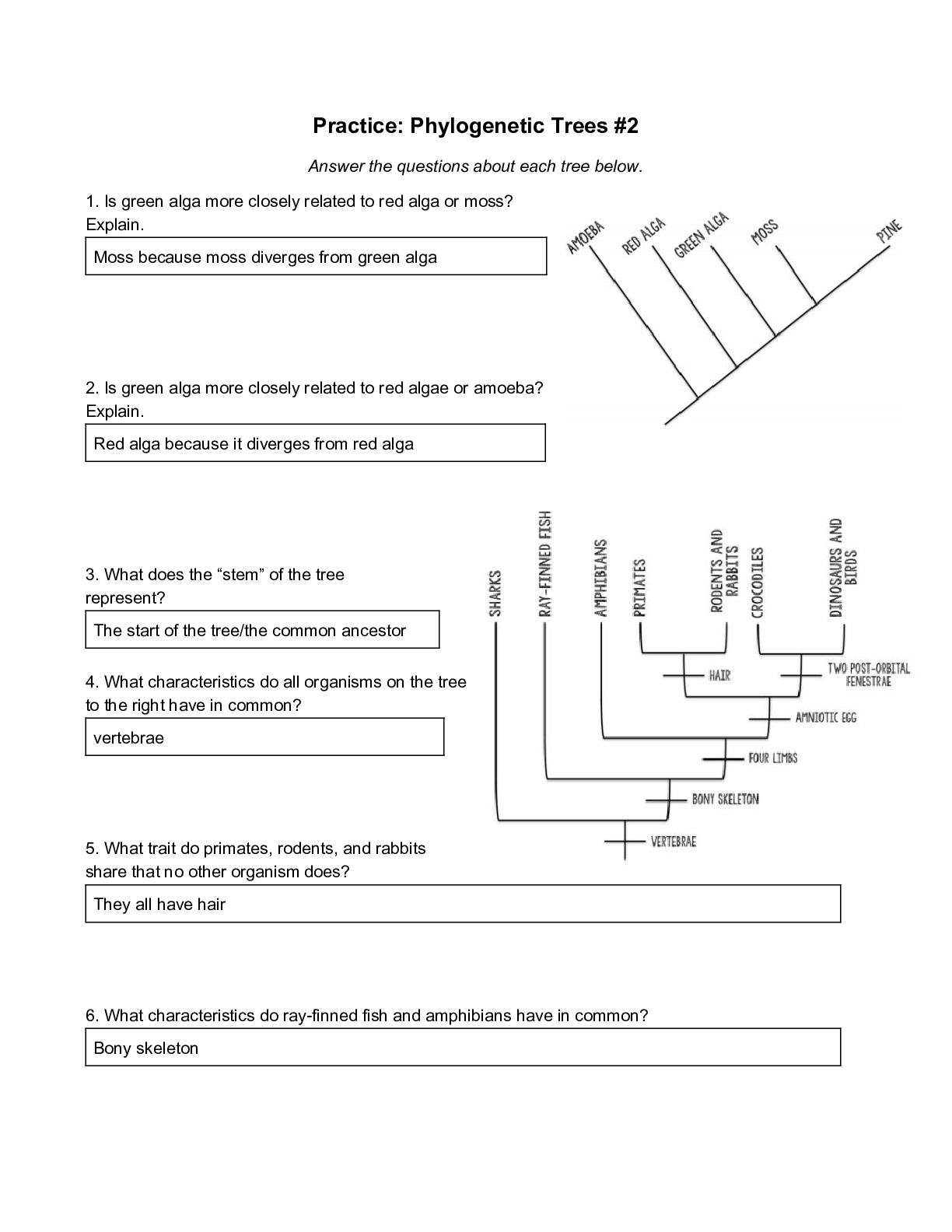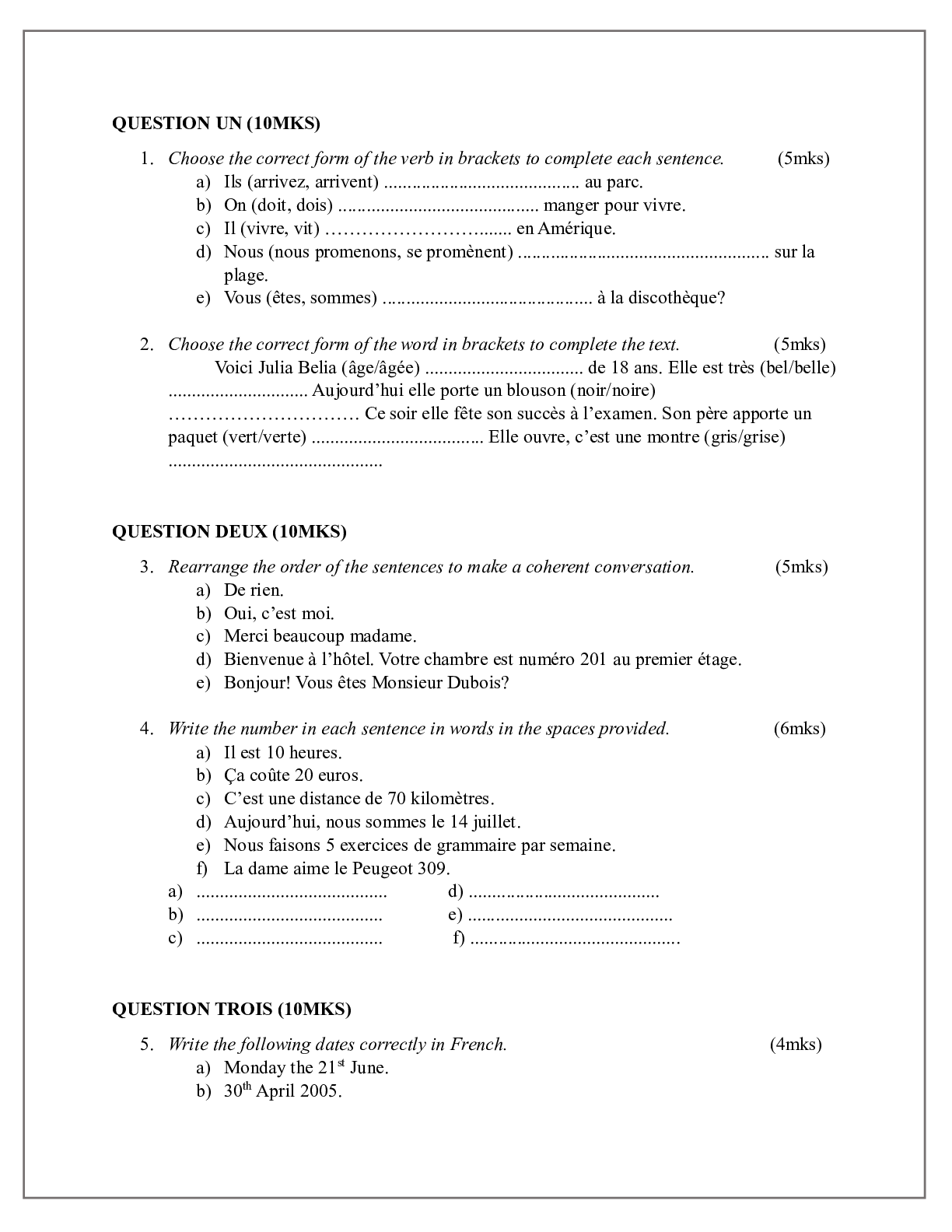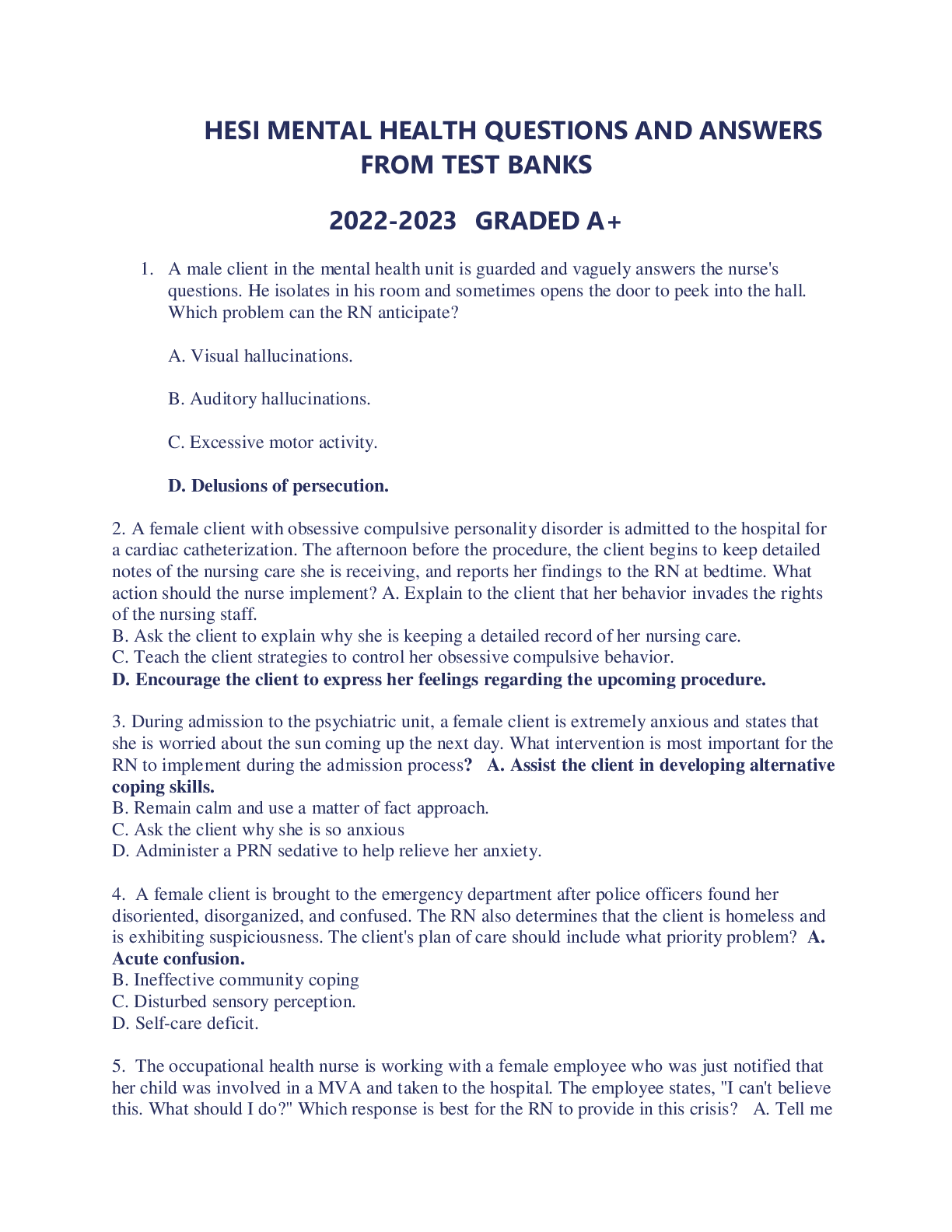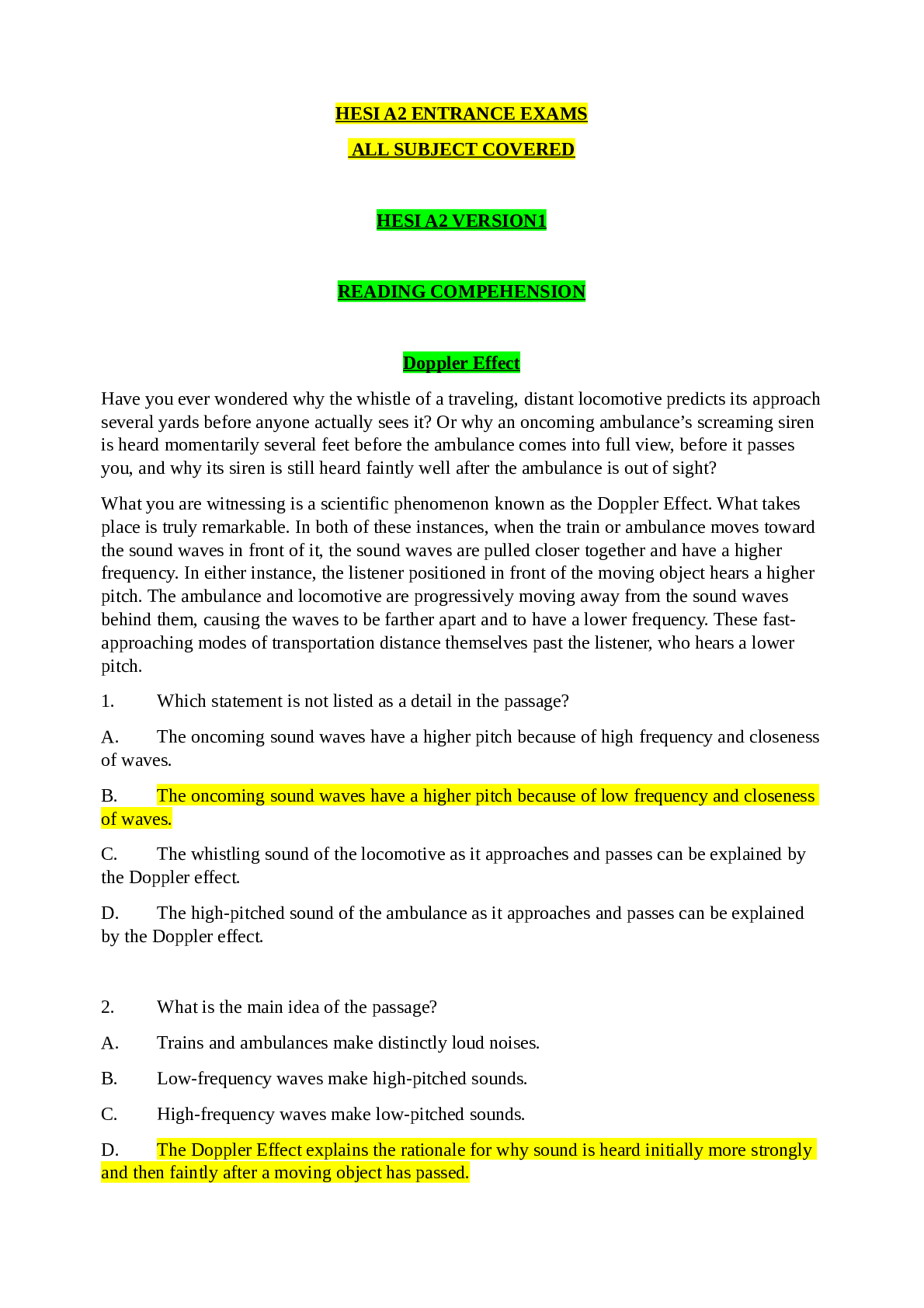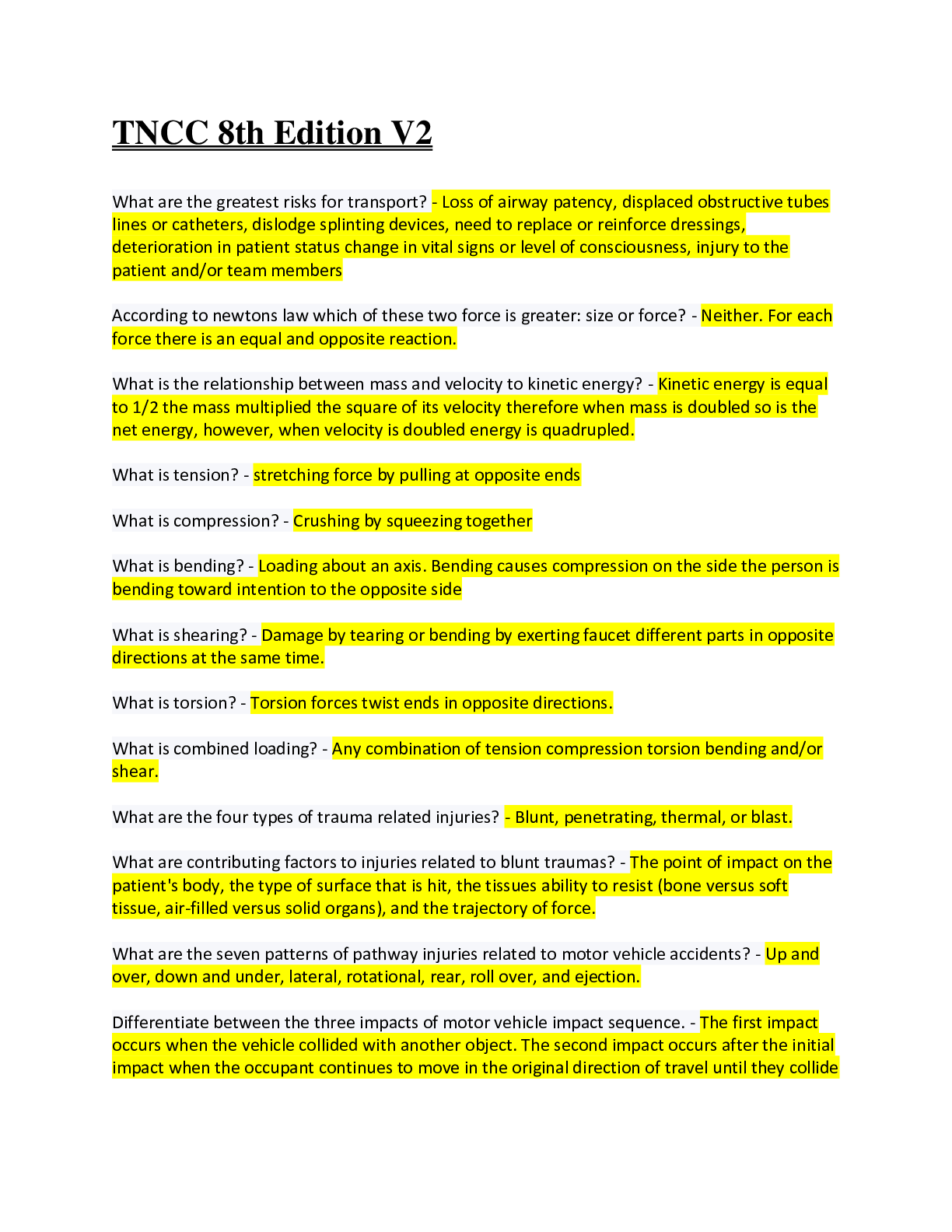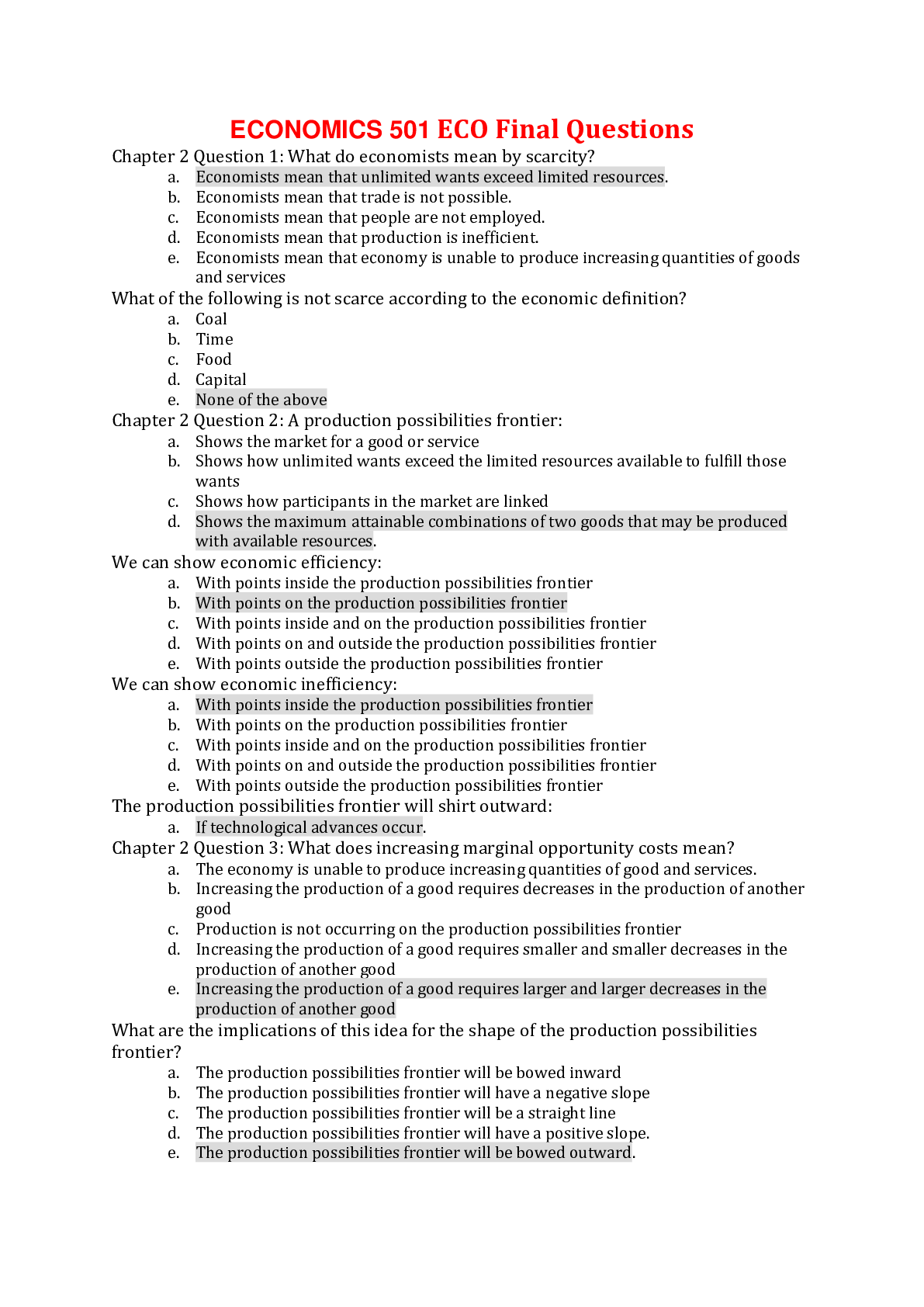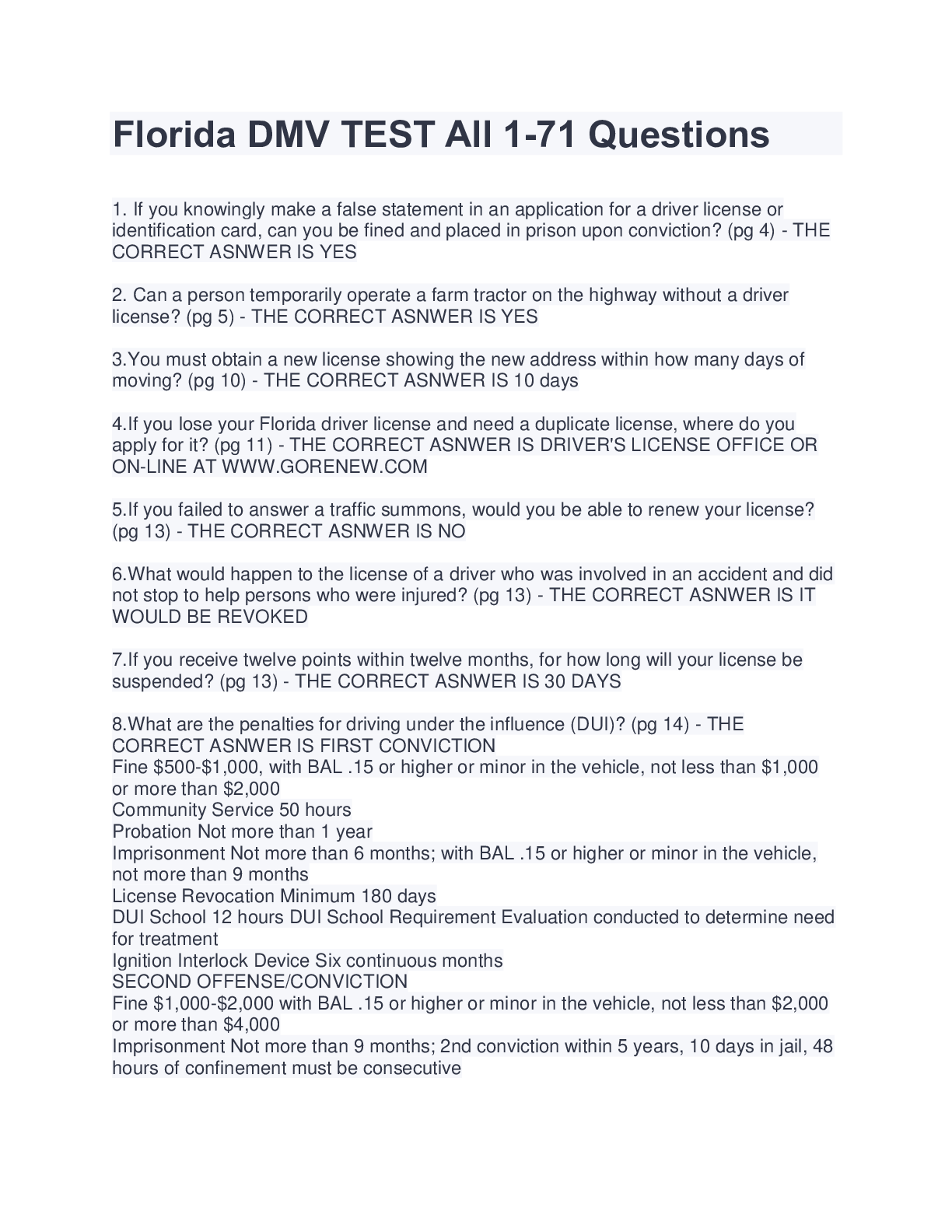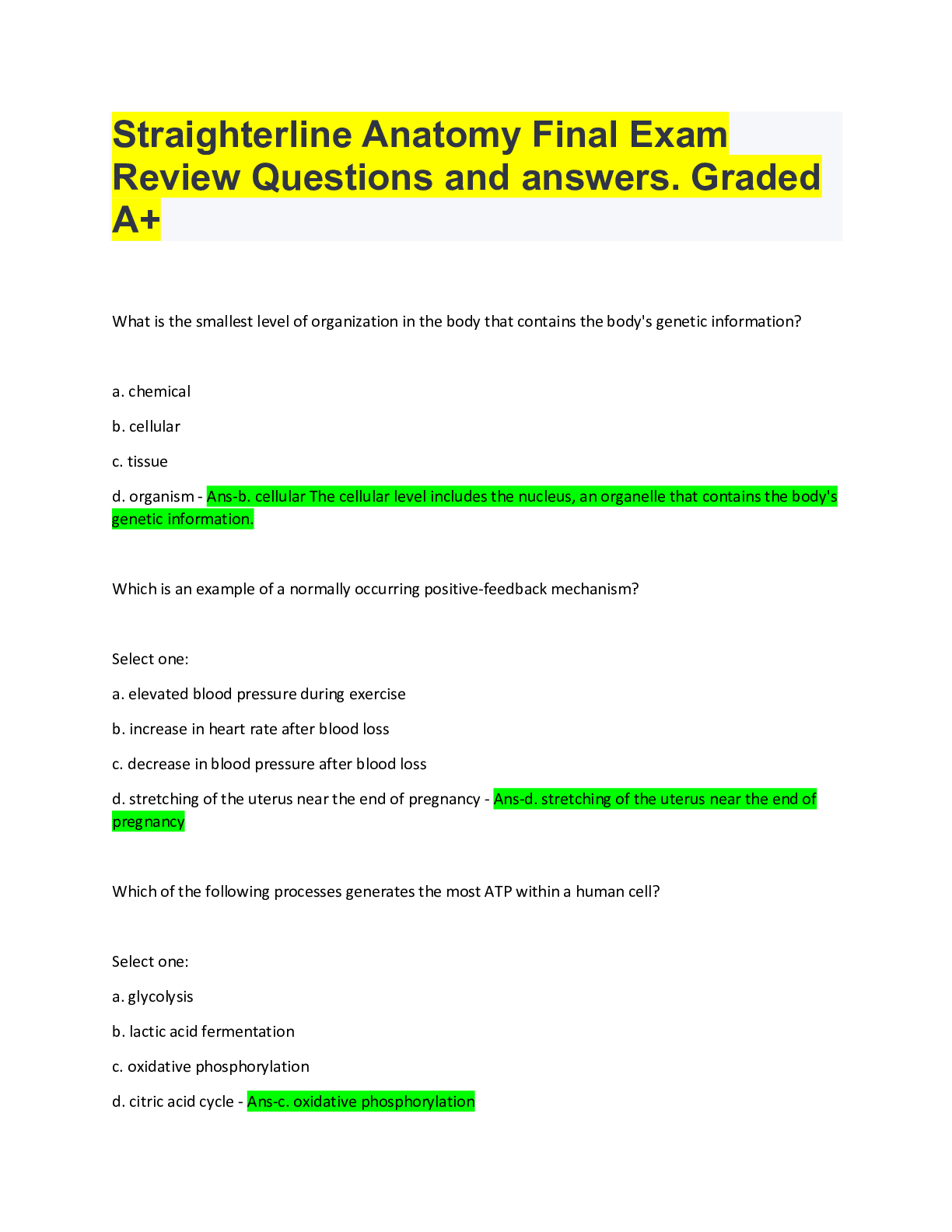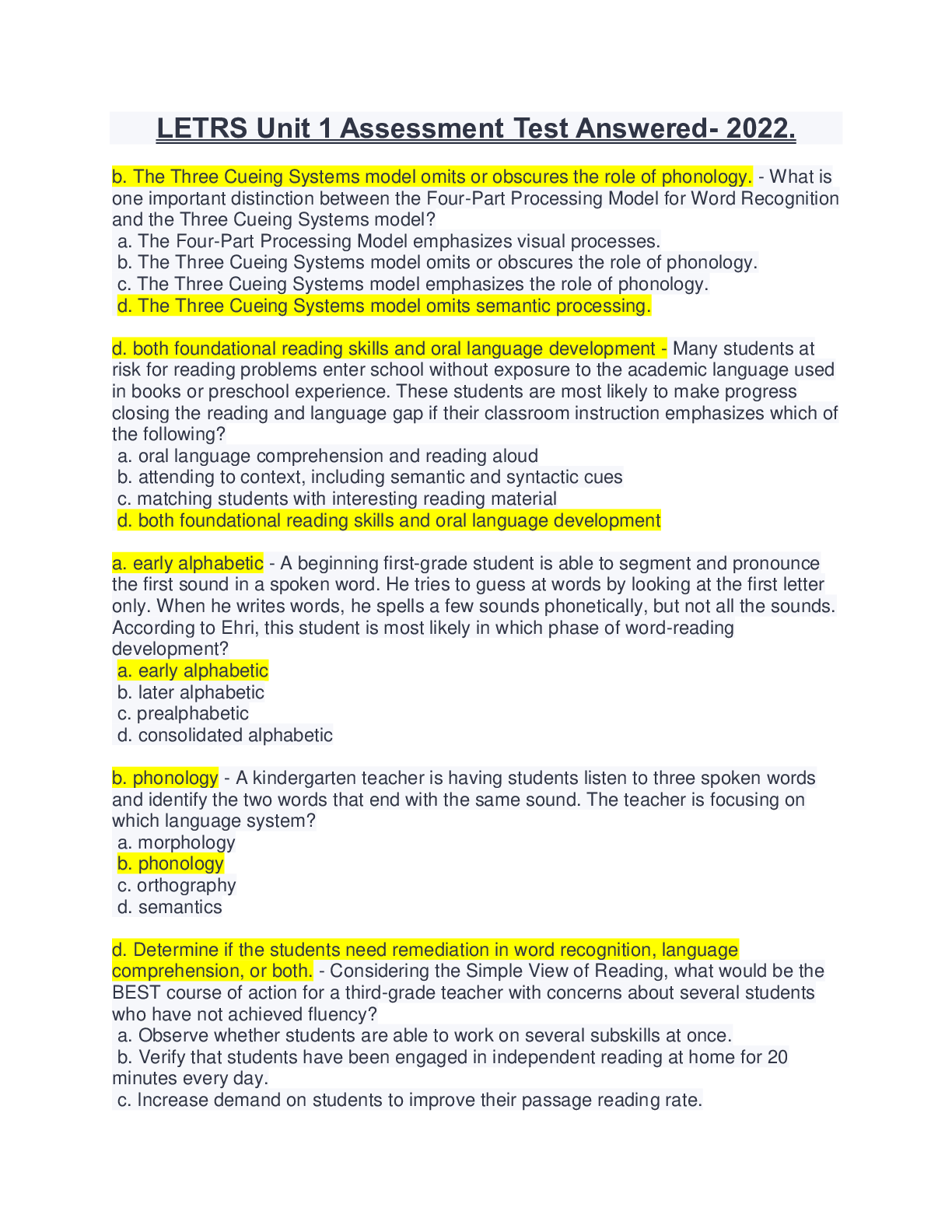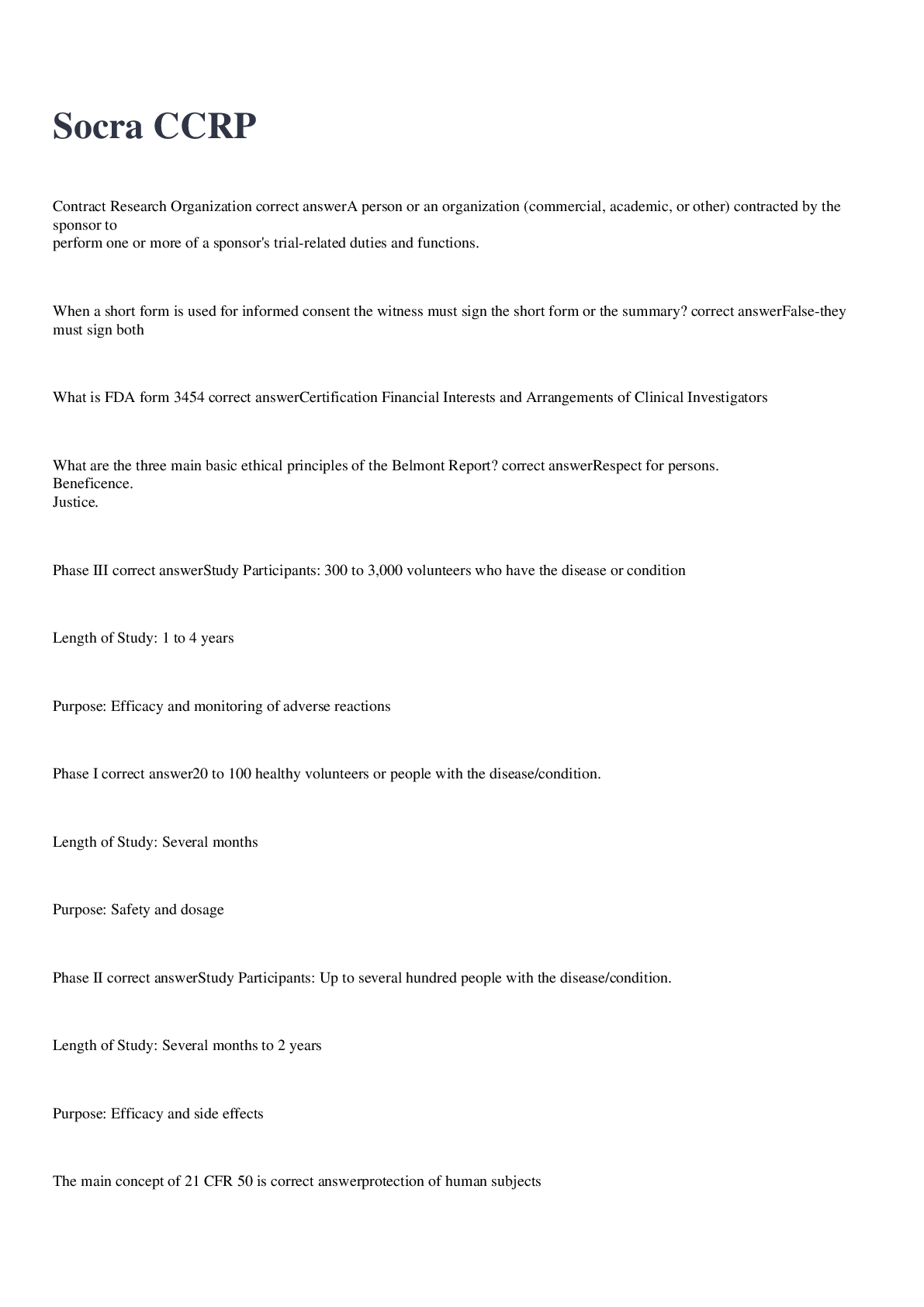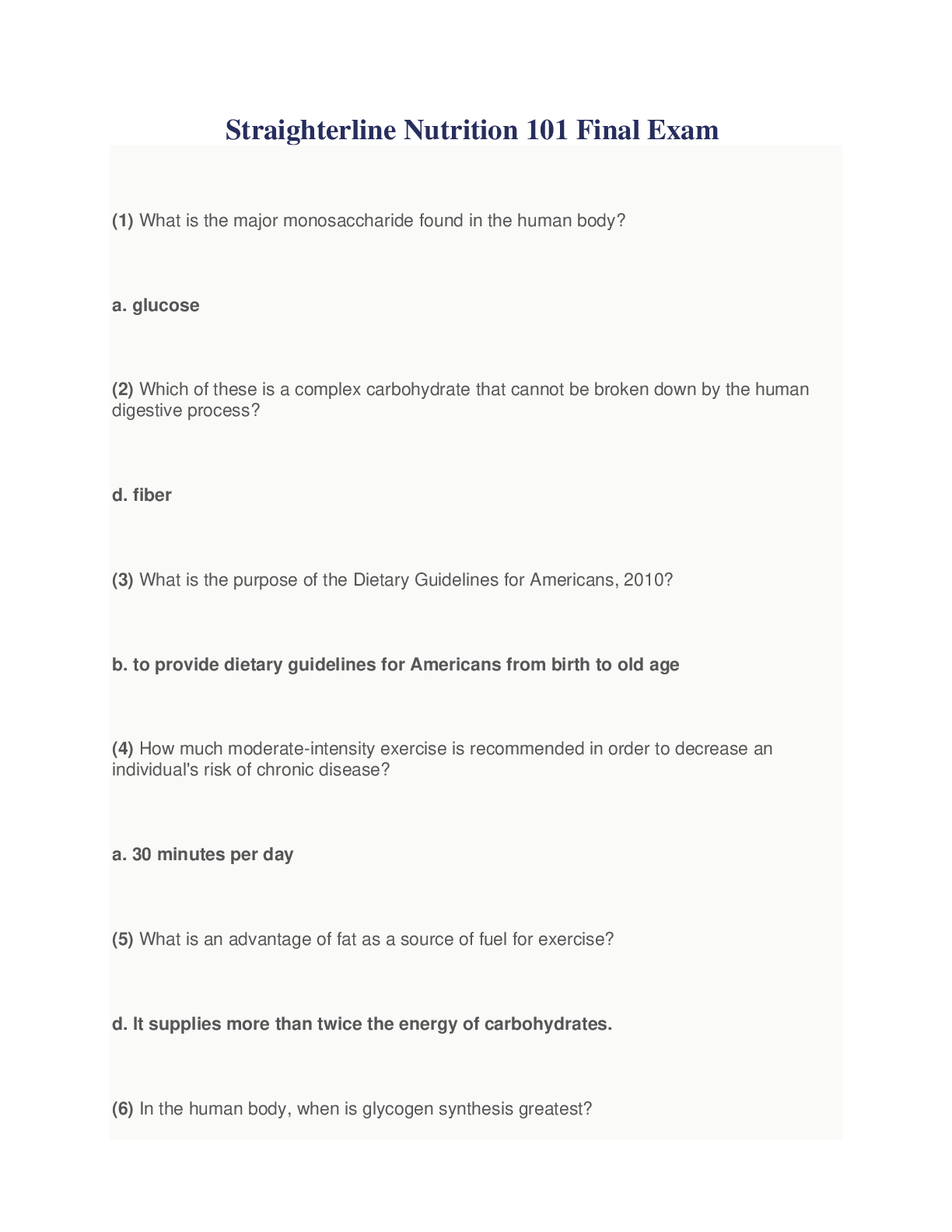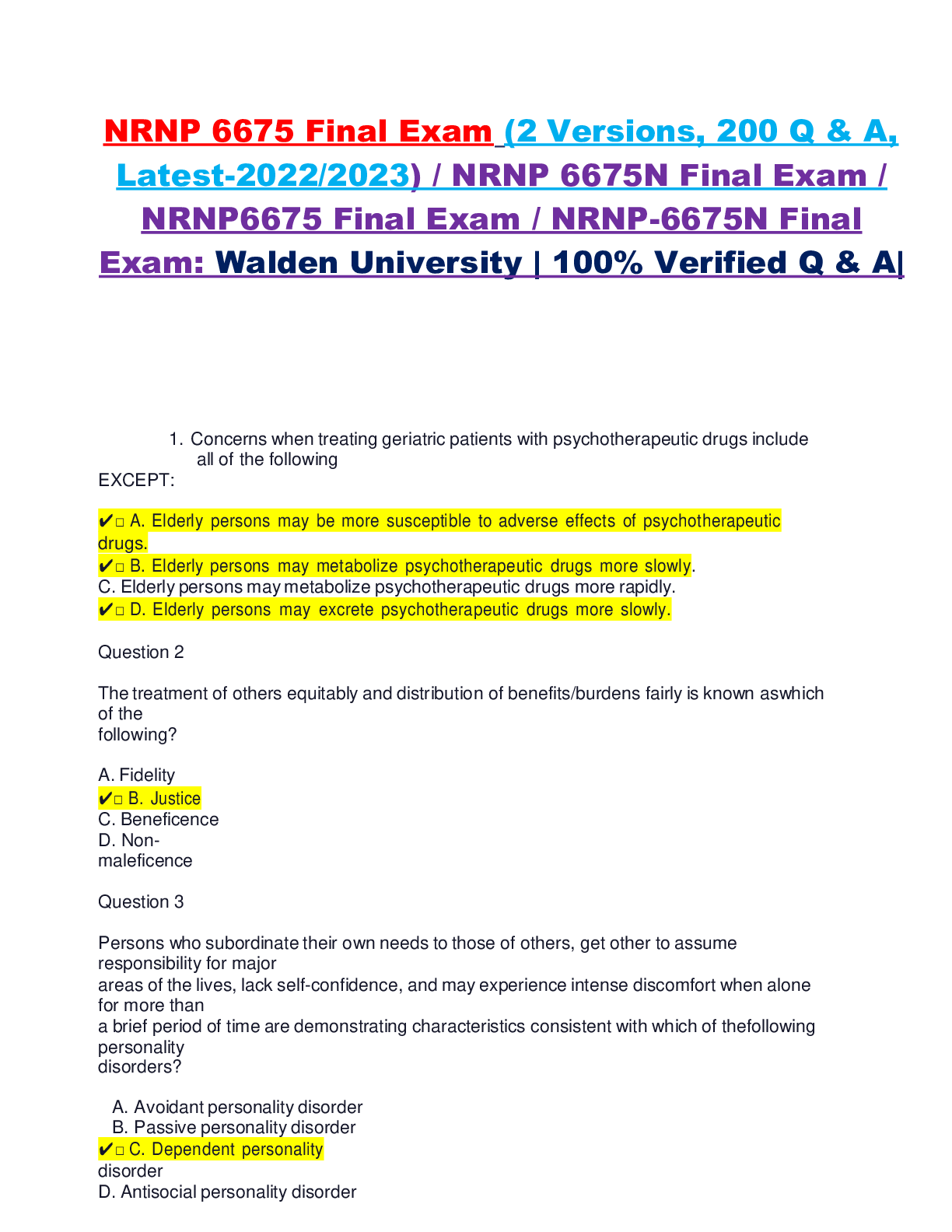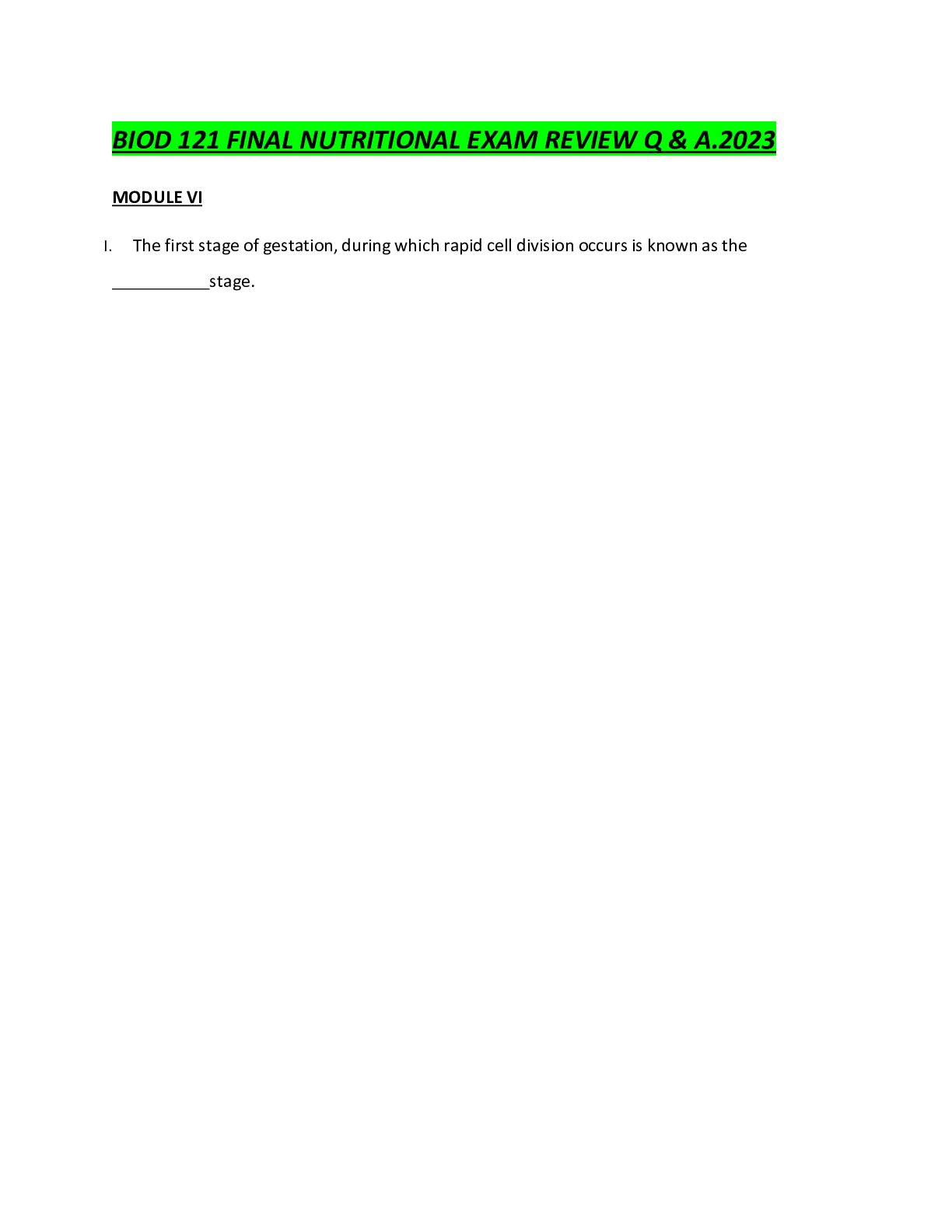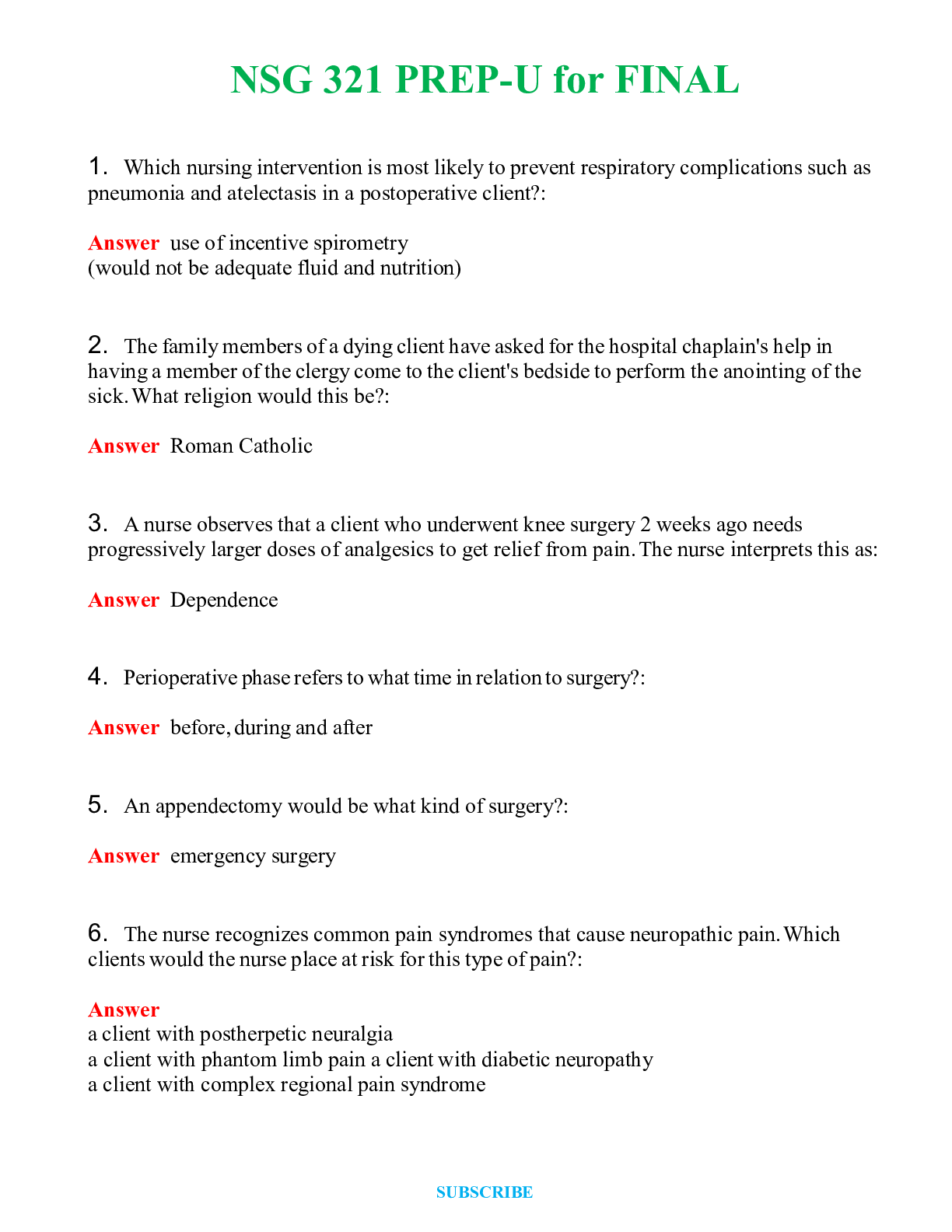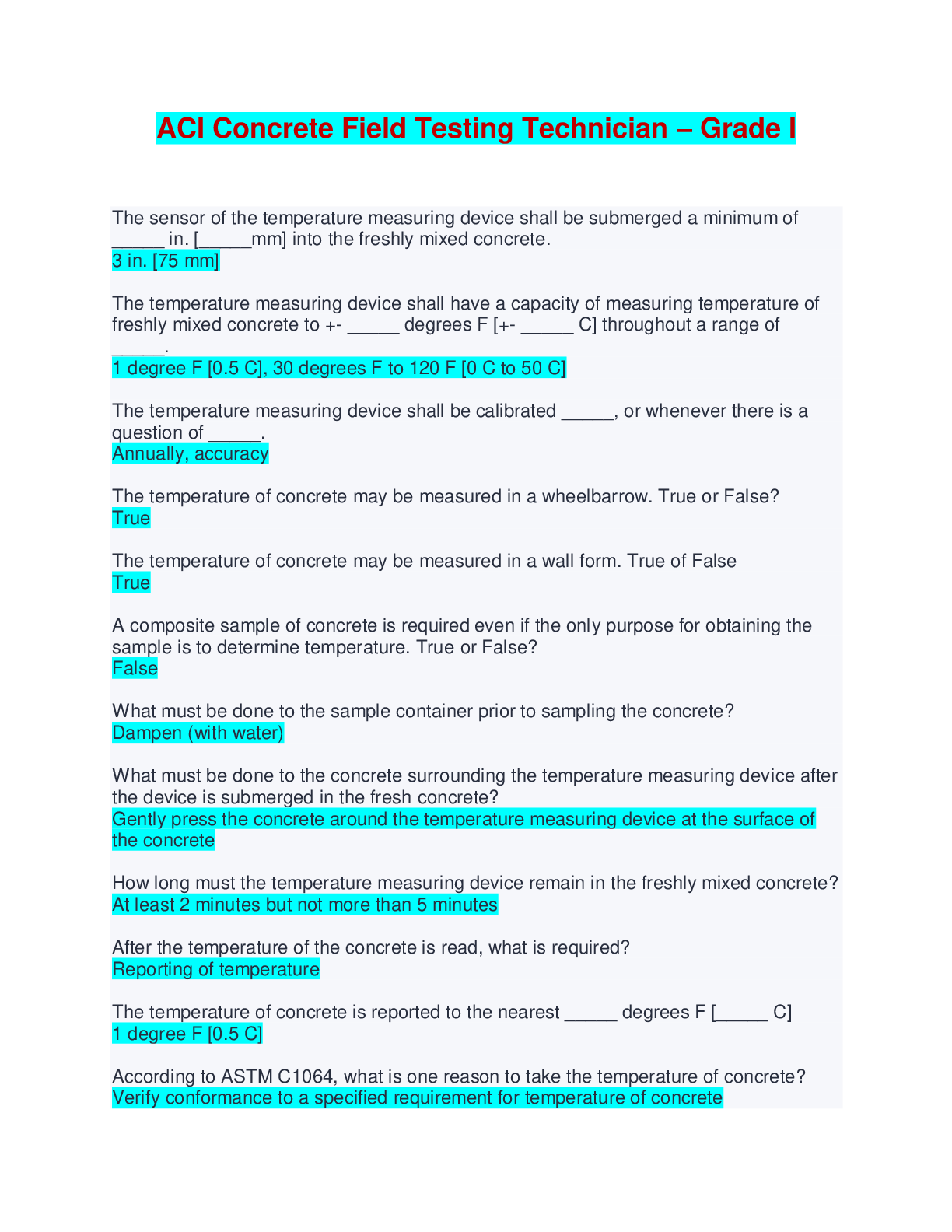Philosophy > EXAM > PHI2604 Proctored Final Exam, 2022 (All)
PHI2604 Proctored Final Exam, 2022
Document Content and Description Below
PHI2604 Proctored Final Exam, 2022-Chpt 1 : Not thinking too deeply or too systematically about ethical concerns a) Isolates you from other people b) Undermines your personal freedom c) Ensures t... hat no moral dilemmas arise d) Helps guide you to moral truth - B) Undermines your personal freedom Chpt 1 : Which of the following is the overall point of the author's discussion of "doing ethics"? a) Doing ethics is difficult, but not doing it is foolish b) Doing ethics requires many years of careful study c) Most people should rely on wiser authorities to do ethics for them d) Doing ethics is unavoidable for everyone - a) Doing ethics is difficult, but not doing it is foolish Chpt 1 : Which field or topic would include tasks such as accurately describing the moral codes and ethical standards of colonial America? a) normative ethics b) applied ethics c) descriptive ethics d) instrumental ethics - c) Descriptive ethics Chpt 1 : 4. What is a major difference between descriptive ethics and normative ethics? a. Normative ethics concerns moral beliefs, whereas descriptive ethics concerns moral behaviors. b. Normative ethics implies that some people's moral beliefs are incorrect, whereas descriptive ethics does not. c. Descriptive ethics cannot be done properly before doing normative ethics. d. Descriptive ethics is not a scientific topic of study, whereas normative ethics is. - B. Normative ethics implies that some people's moral beliefs are incorrect, whereas descriptive ethics does not. Chpt 1: Morality refers to beliefs about a. Praise and punishment b. Right and wrong, good and bad c. Legal and Moral standards d. Typical behavior in one's society - b. Right and wrong, good or bad Chpt 1: Believing that you can establish all your moral beliefs by consulting your feelings is an example of a. subjectivism. b. objectivism c. The meaning and logical structure of moral beliefs d. Critical scrutiny - a. subjectivism Chpt 1: What does normative ethics study? a. theories that explain why people behave as they do b. normative standards in different disciplines c. the meaning and logical structure of moral beliefs d. principles, rules, or theories that guide our actions and judgments - d. principles, rules, or theories that guide our actions and judgments Chpt 1: Which of these questions belongs to metaethics? a. What moral beliefs do cultures embody? b. What does it mean for an action to be right? c. What theories of ethics do individuals endorse? d. What is the meaning of life from a moral perspective? - b. What does it mean for an action to be right? chpt 1 : Applied ethics is the a. application of normative ethics to metaethics. b. application of society's rules to one's own life. c. study of the principles and rules that everyone accepts. d. application of moral norms to specific moral issues or cases. - d. application of moral norms to specific moral issues or cases. chpt 1: Which field concerns questions such as "Was this abortion permissible?" or "Was this instance of mercy killing immoral?" a. applied ethics d. descriptive ethics c. normative ethics b. metaethics - a. applied ethics chpt 1: The preeminence of reason refers to the a. times when our emotions overwhelm our reason b. gap between our feelings and our reason. c. overriding importance of critical reasoning in ethics. d. guidance that conscience gives to our reason. - c. overriding importance of critical reasoning in ethics. chpt 1: Which of the following is a consequence of the principle of universalizability? a. If harming someone is wrong in a particular situation, then harming someone would be wrong for anyone in a relevantly similar situation. b. If harming someone is wrong in a particular situation, then harming someone would be wrong in all situations. c. The moral rules implied by your behavior apply to everyone, even in dissimilar situations. d. A person's morality is dictated by his or her culture-wide morality. - a. If harming someone is wrong in a particular situation, then harming someone would be wrong for anyone in a relevantly similar situation. chpt 1: Which statement would the author most likely agree with, based on what he states in this chapter? a. If your moral beliefs depend on your religious views, it is important to be able to convince others of your religious views before presenting your moral beliefs. b. Because we live with people who have different religious views, we need standards for moral reasoning that do not depend on any particular religious views. c. Religious believers tend not to think about morality as much as nonbelievers do. d. Religious believers tend to have more detailed moral beliefs than nonbelievers do - b. Because we live with people who have different religious views, we need standards for moral reasoning that do not depend on any particular religious views. chpt 1: Which of the following correctly applies the principle of impartiality? a. A mass murderer deserves the same treatment as a heart surgeon. b. You cannot fairly punish one member of a group unless you punish all of them. c. All moral judgments must be made on a case-by-case basis, setting aside all personal biases. d. Everyone deserves the same treatment, unless there is a morally relevant reason to favor someone. - d. Everyone deserves the same treatment, unless there is a morally relevant reason to favor someone. chpt 1 : The dominance of moral norms suggests that if a speed limit on highway conflicts with a person's moral duty to rush a dying man to the hospital, then a. the moral duty would be as weighty as the legal duty. b. neither the legal duty nor the moral duty would apply. c. the moral duty would take precedence over the legal duty. d. the moral duty would sanction any method whatsoever of getting the dying man to the hospital. - c. the moral duty would take precedence over the legal duty. chpt 1; Which of these illustrates the need for moral reasoning when applying religious moral codes? a. My religious moral code includes a general rule not to kill, but sometimes killing might be the only way to defend myself. b. My religious moral code includes a general rule not to lie, but some people lie frequently. c. My religious moral code has many rules that are not relevant to me. d. My religious moral code is difficult to follow because it is very strict and demanding. - d. My religious moral code is difficult to follow because it is very strict and demanding. Chpt 1; When religious adherents claim that murder is wrong because God says that it is, they are implicitly espousing the a. legal theory of divine justice. b. religious demand theory. c. greatest happiness principle. d. divine command theory. - d. divine command theory. chpt 1: In arguing against the divine command theory, many critics insist that a. God has the power to will actions to be morally permissible. b. if an action is right only because God wills it, then all actions are right. c. if an action is right only because God wills it, then many evil actions would be right if God willed them. d. if an action is right only because God wills it, then many evil actions would be right for believers but wrong for nonbelievers. - c. if an action is right only because God wills it, then many evil actions would be right if God willed them. chpt 1 ; Why does Leibniz, the great theistic philosopher, reject the divine command theory? a. because it implies God is beyond our understanding b. because it implies God is unworthy of worship c. because it implies a utilitarian conception of morality d. because it implies God plays no role in morality - b. because it implies God is unworthy of worship chpt 1; Which of these best describes the purpose of the book's discussion of ethics and religion? a. to convince religious believers of the value of doing ethics b. to convince the reader that religious moral codes and theories are unacceptable c. to convince the reader to question everything about morality d. to convince religious believers that ethics is a replacement for religious beliefs - a. to convince religious believers of the value of doing ethics Chpt 2: Subjective relativism is the doctrine that a. an action is morally right if one approves of it. b. an action is morally right if one's culture approves of it. c. actions are judged by objective standards. d. an action is morally right even if no one approves of it. - a. an action is morally right if one approves of it. chpt 2; Suppose I think that I sometimes make mistakes on moral matters, and so does my culture. Acknowledging this, I say, "My moral beliefs are sometimes wrong and sometimes my culture's moral principles are wrong as well." On which view could my statement be true? a. emotivism b. cultural c. objectivism relativism d. subjective relativism - c. objectivism relativism chpt 2; . Objectivism is the view that a. moral principles are rigid rules that have no exceptions. b. there are no objective moral principles. c. some moral principles are valid for everyone. d. moral utterances are neither true nor false. - c. some moral principles are valid for everyone. chpt 2; Subjective relativism implies that when Sofia says, "I think abortion is wrong," and Emma replies, "I think abortion is permissible," Sofia and Emma are a. having a moral disagreement. b. really saying the same thing. c. not having a moral disagreement d. not entirely serious. - c. not having a moral disagreement chpt 2: Subjective relativism implies that when a person states their moral beliefs, that person is a. incapable of making moral judgments. b. incapable of being in error. c. morally fallible. d. infallible on some moral judgments, but not others. - b. incapable of being in error. chpt 2; Both objectivists and cultural relativists agree that a. the truth of moral judgments depends on whether one's culture approves of them. b. moral judgments differ from culture to culture. c. moral judgments do not differ from culture to culture. d. the truth of moral judgments does not depend on whether one's culture approves of them. - b. moral judgments differ from culture to culture. chpt 2; Which statement is a consequence of objectivism? a. Moral rules apply in all cases, without exceptions. b. If two people have a moral disagreement, only one of them can be right. c. Everyone has the same beliefs about morality. d. Whether an action is objectively right depends on its consequences. - a. Moral rules apply in all cases, without exceptions. chpt 2: Cultural relativists may believe their theory promotes tolerance of other cultures. However, the author argues against this. Which statement best summarizes his argument? a. Cultural relativists really only value the practices of some cultures, not all cultures. b. Subjective relativists and emotivists can also promote tolerance. c. Tolerance is not really a good thing, and so cultural relativists should not support it. d. Cultural relativists cannot consistently say that tolerance is objectively good. - d. Cultural relativists cannot consistently say that tolerance is objectively good. chpt 2; . According to the main argument for cultural relativism, if culture X and culture Y disagree about the morality of physician-assisted suicide, this shows that a. right and wrong are not relative to cultures. b. physician-assisted suicide is permissible. c. either culture X or culture Y must be correct. d. no view can be objectively correct. - d. no view can be objectively correct. chpt 2; Objectivists argue that the diversity of moral judgments across cultures does not necessarily indicate that there is disagreement about moral beliefs, but instead may indicate that a. the moral beliefs do not matter. b. there are divergent nonmoral beliefs c. nonmoral beliefs do not differ. d. disagreement is not possible. - b. there are divergent nonmoral beliefs chpt 2; Which feature of emotivism makes it different from subjective relativism? [Show More]
Last updated: 1 year ago
Preview 1 out of 37 pages
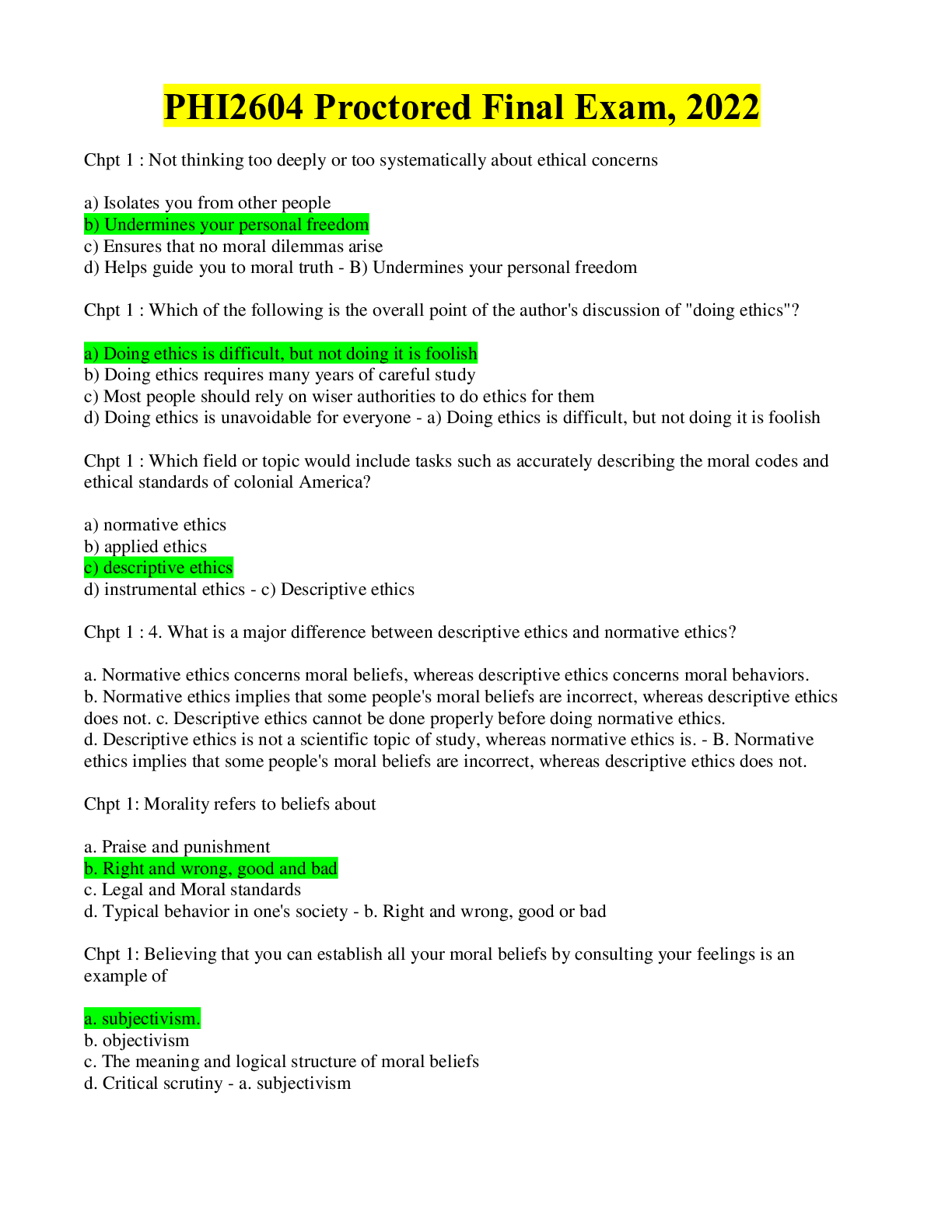
Reviews( 0 )
Document information
Connected school, study & course
About the document
Uploaded On
Jun 05, 2022
Number of pages
37
Written in
Additional information
This document has been written for:
Uploaded
Jun 05, 2022
Downloads
0
Views
94

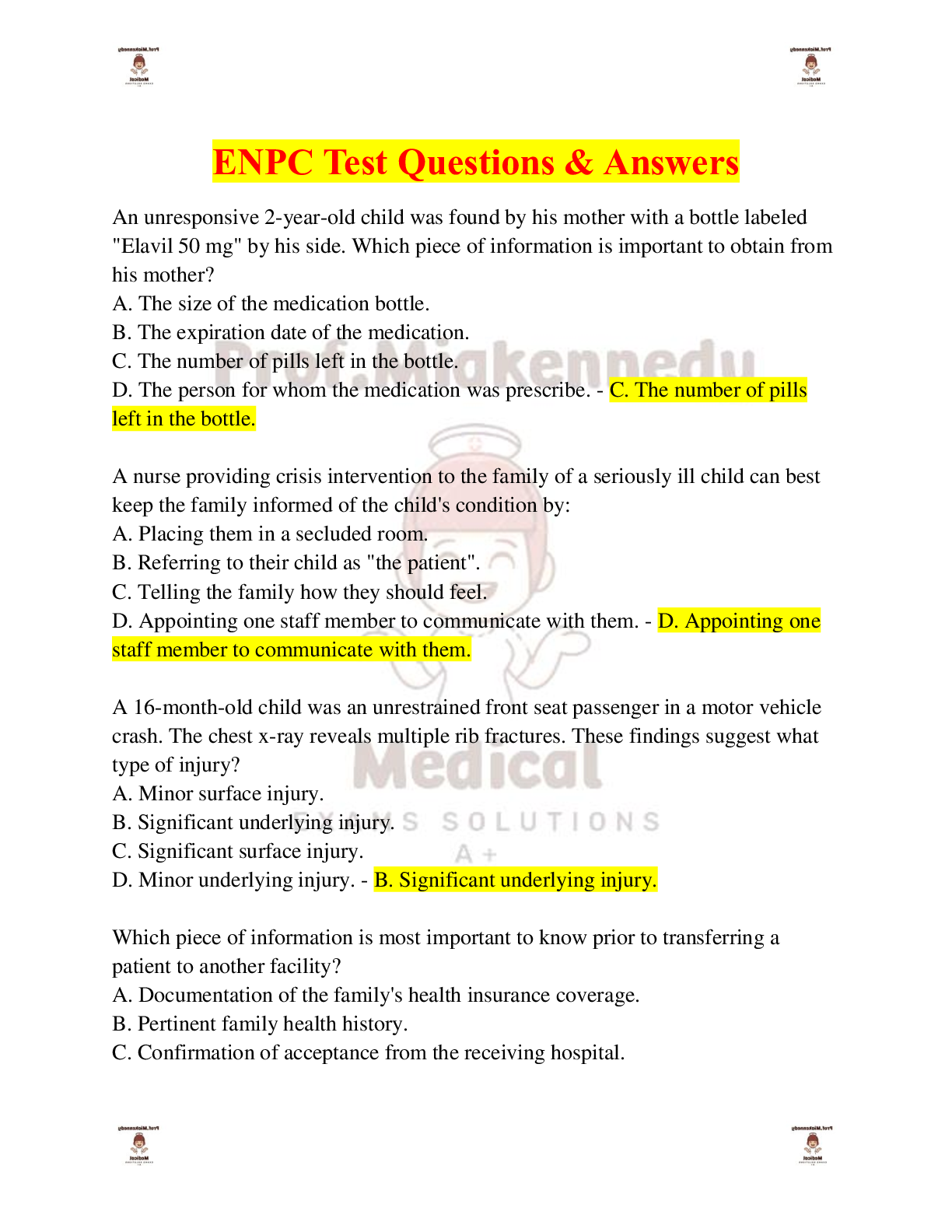
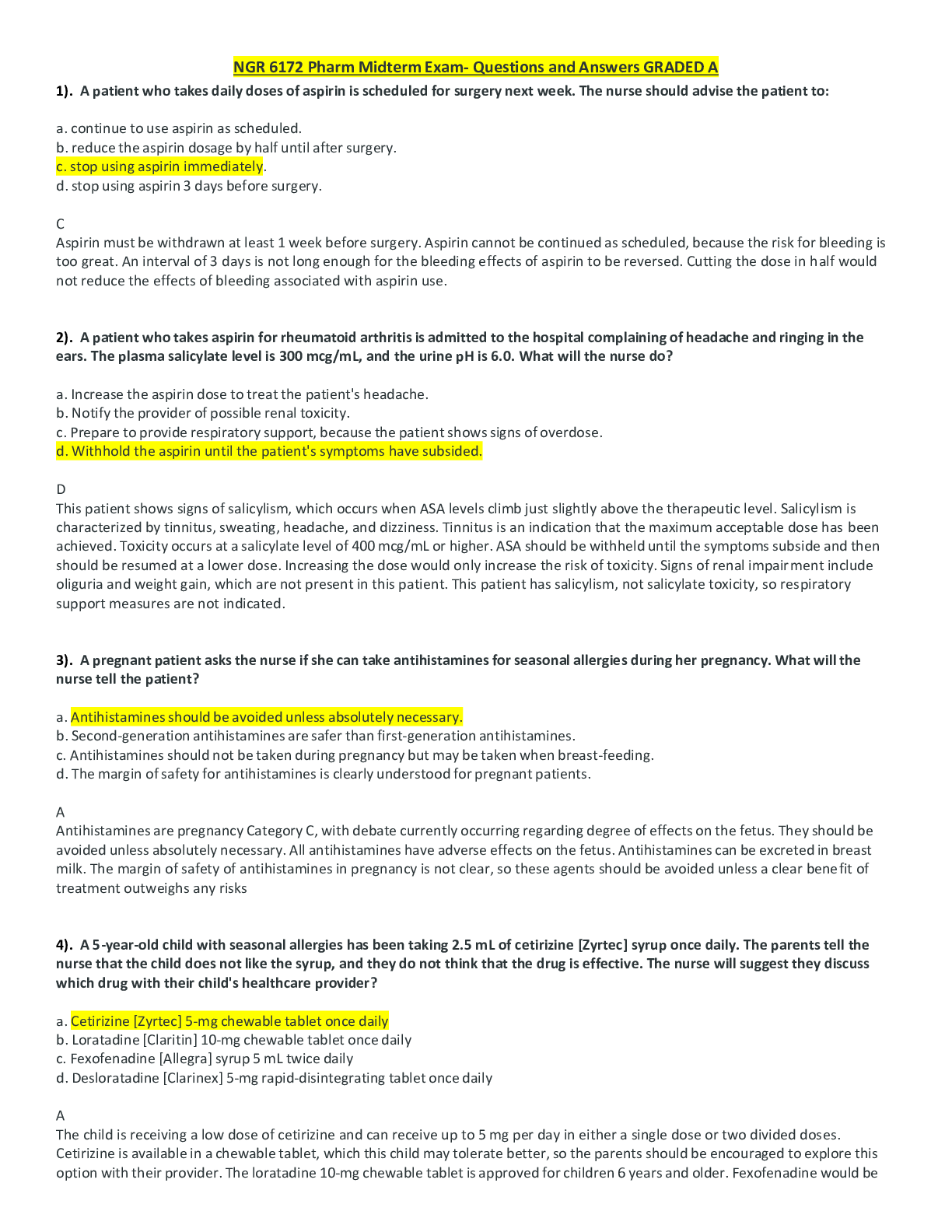
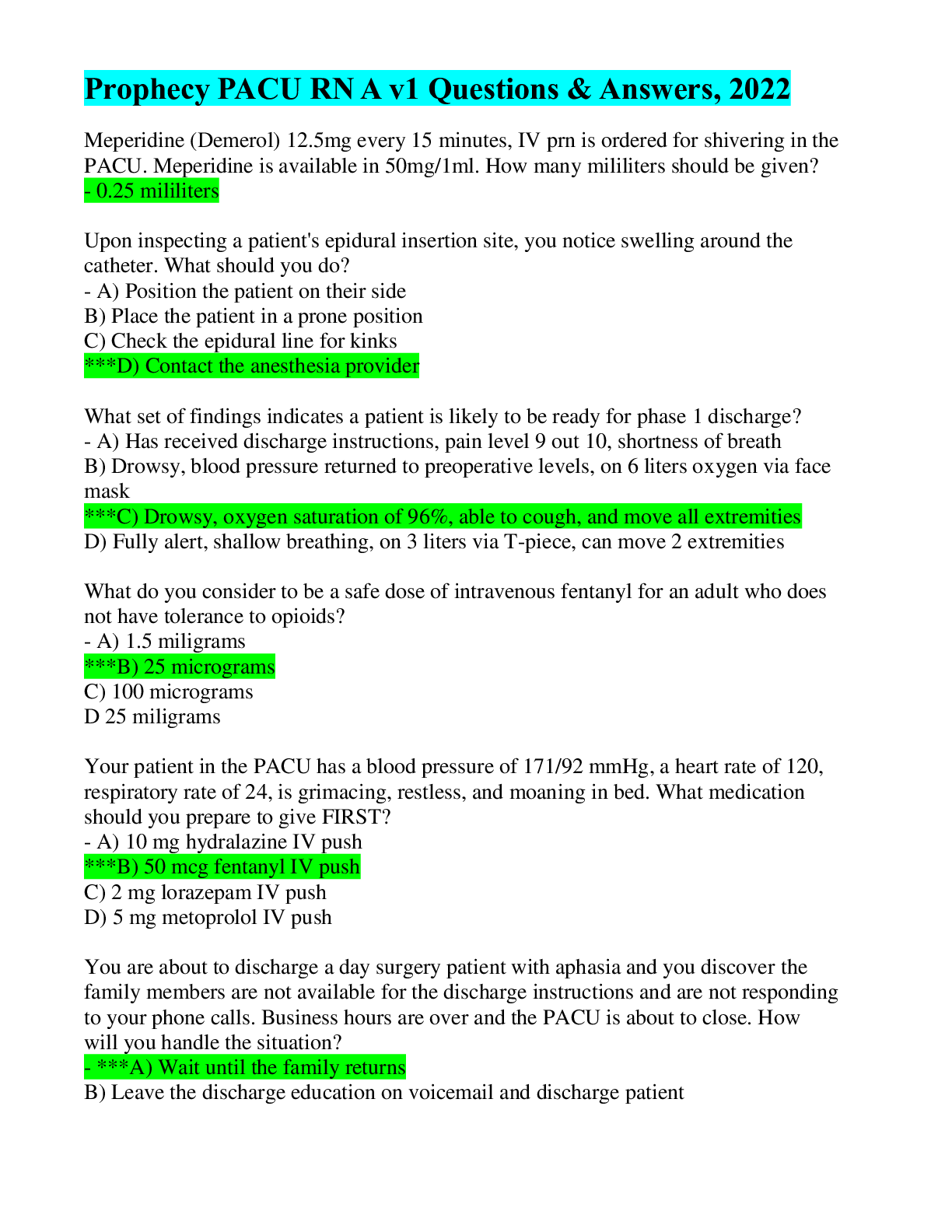
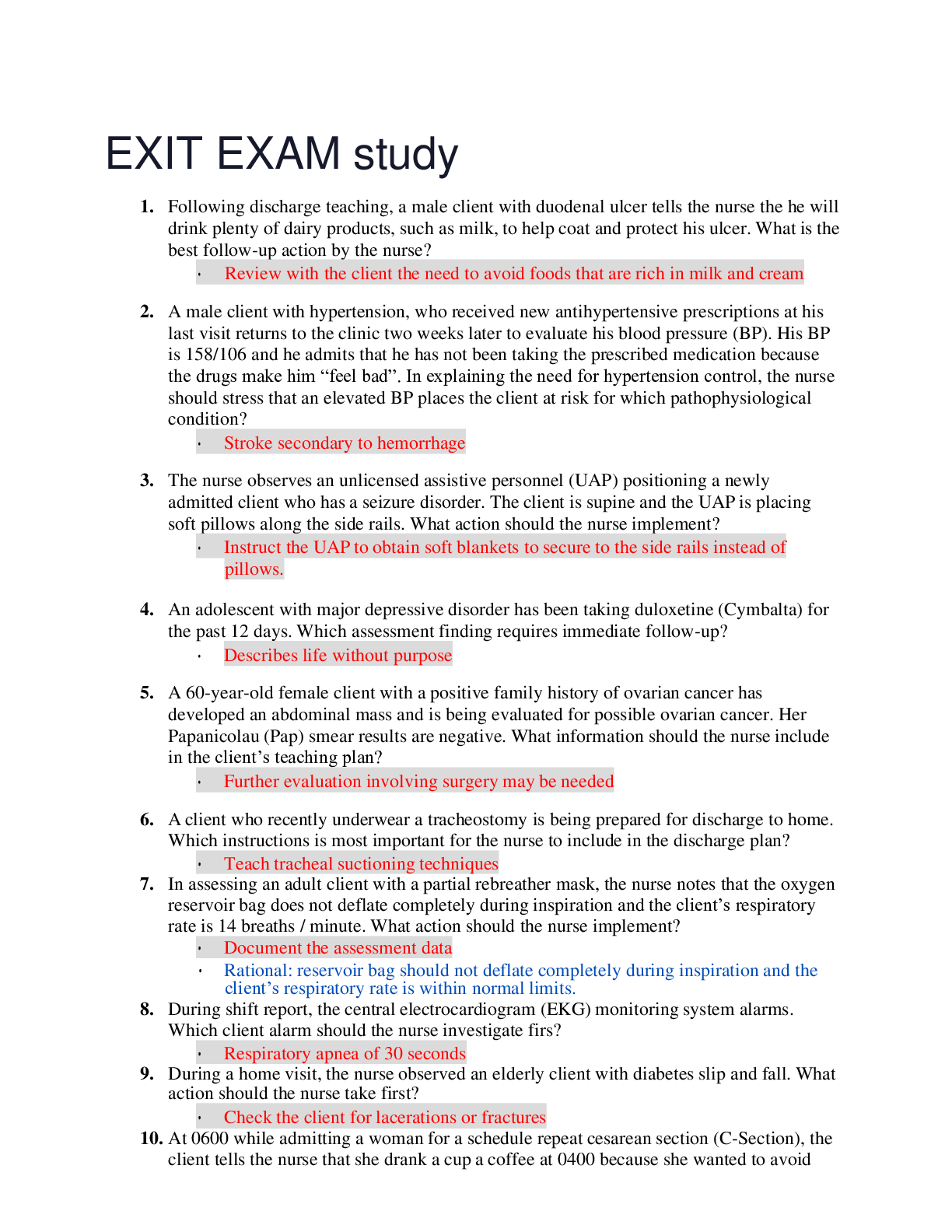
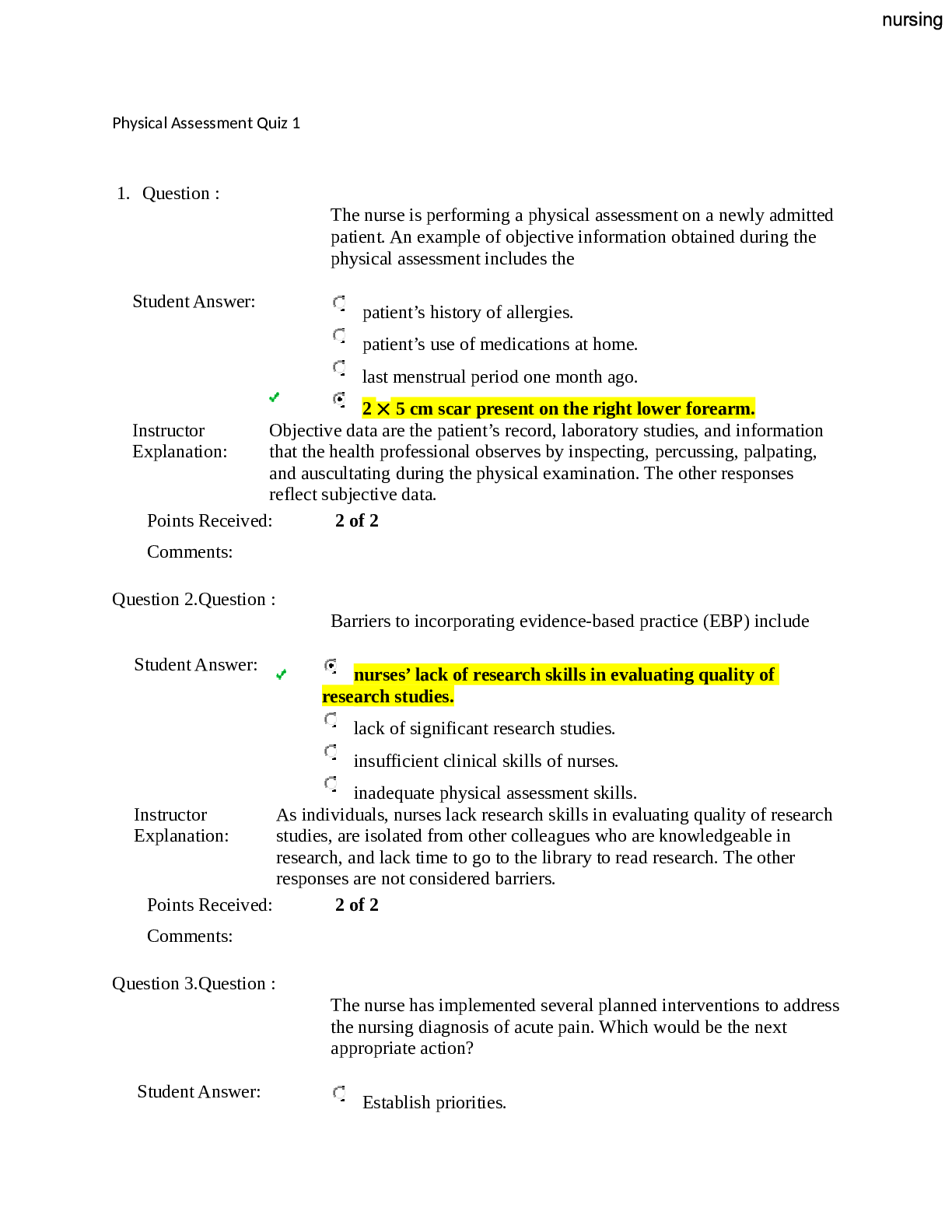
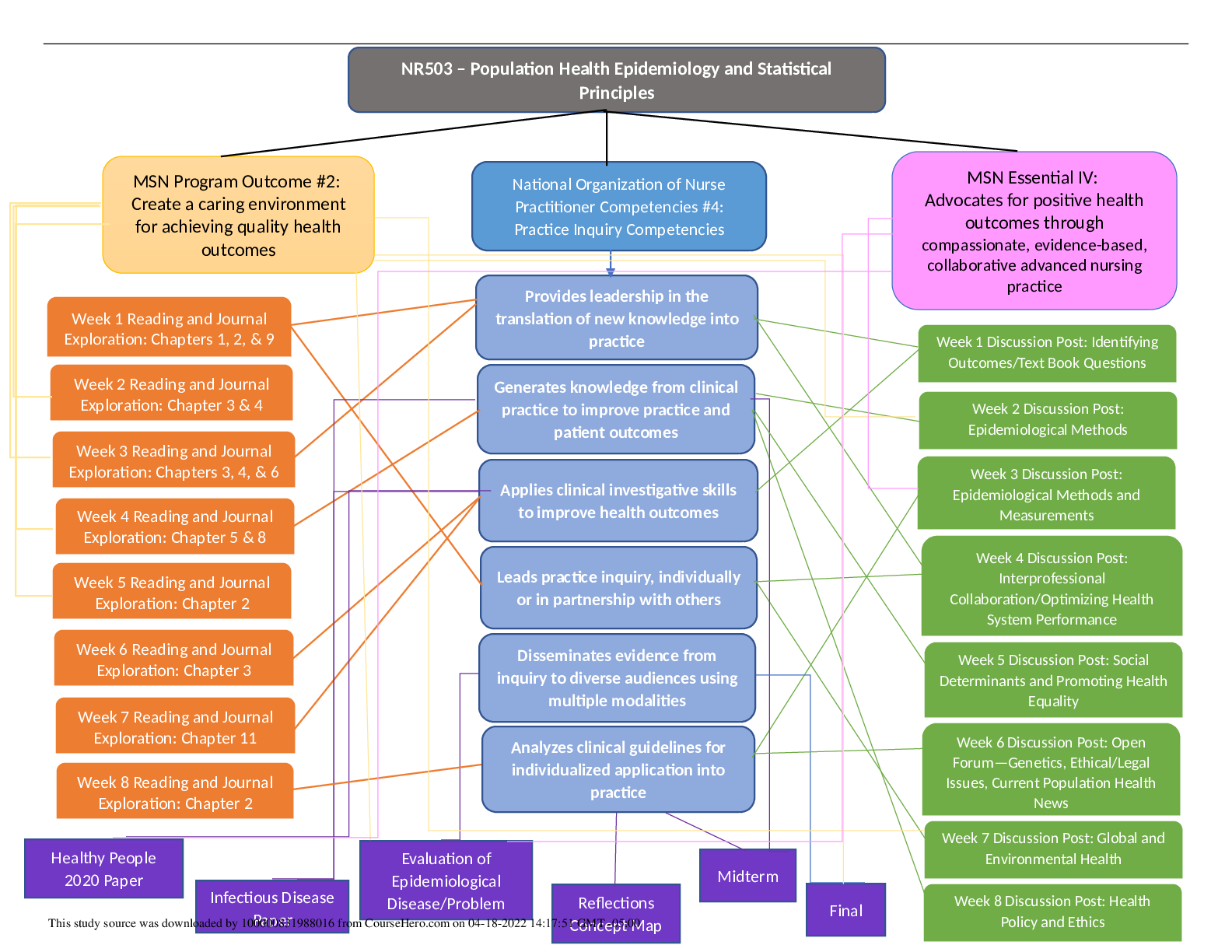

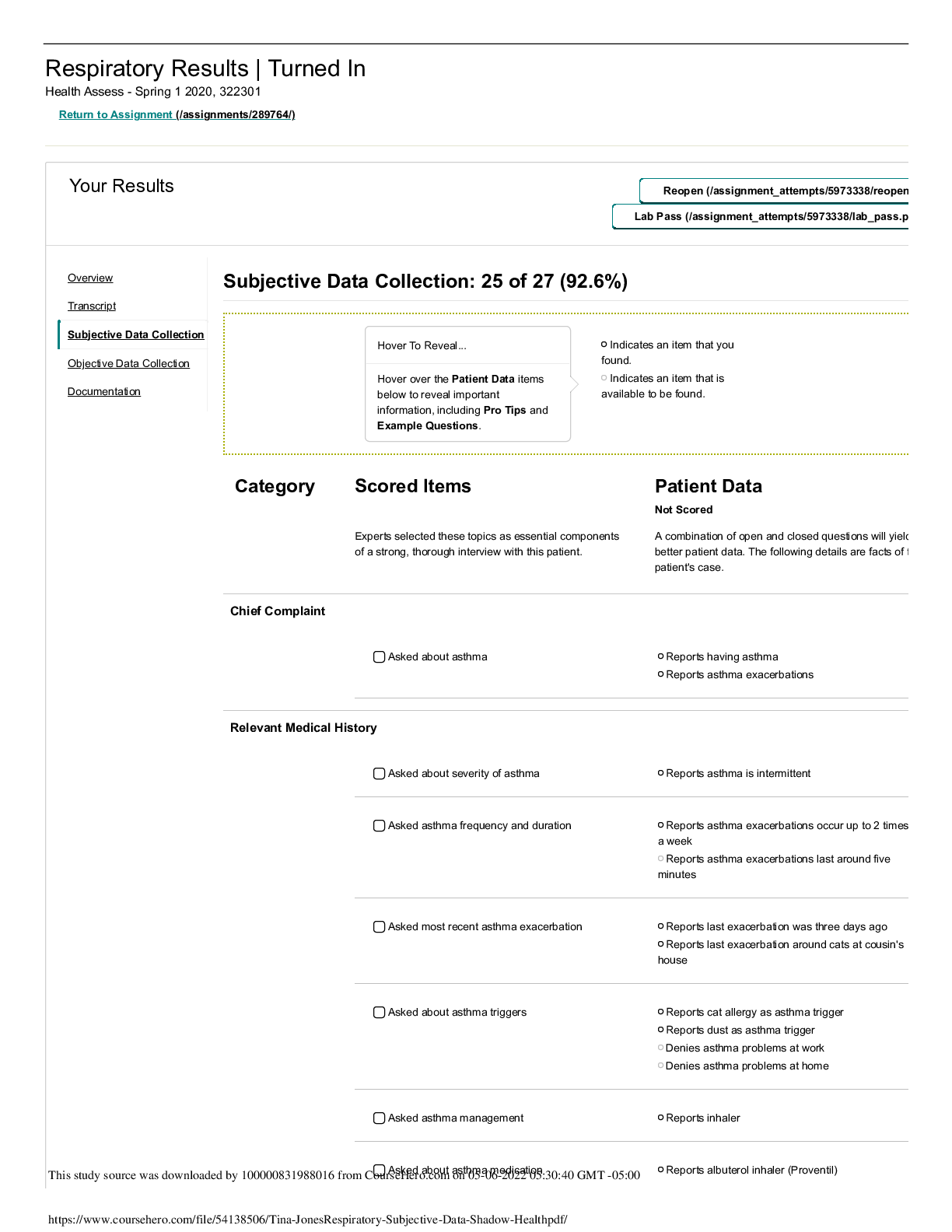
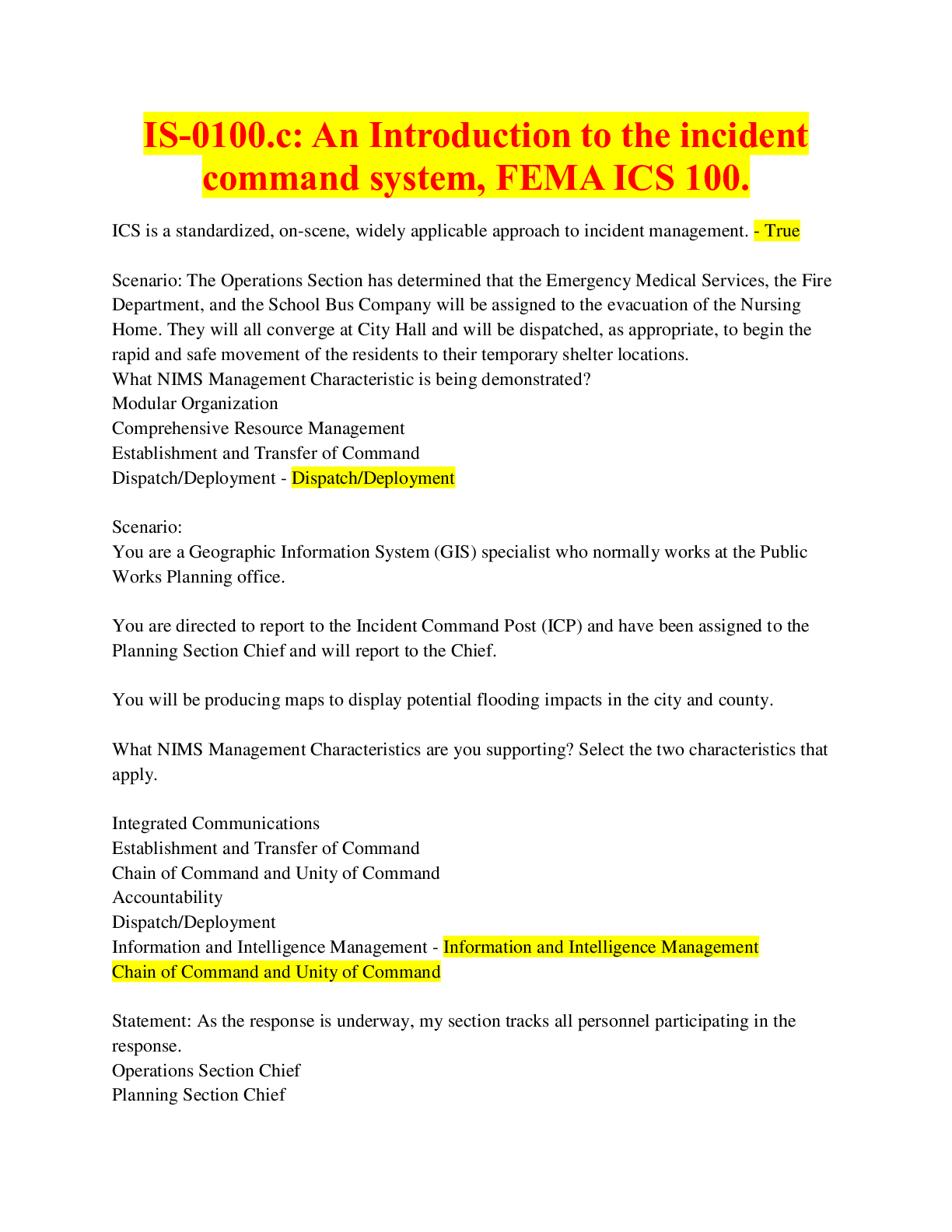

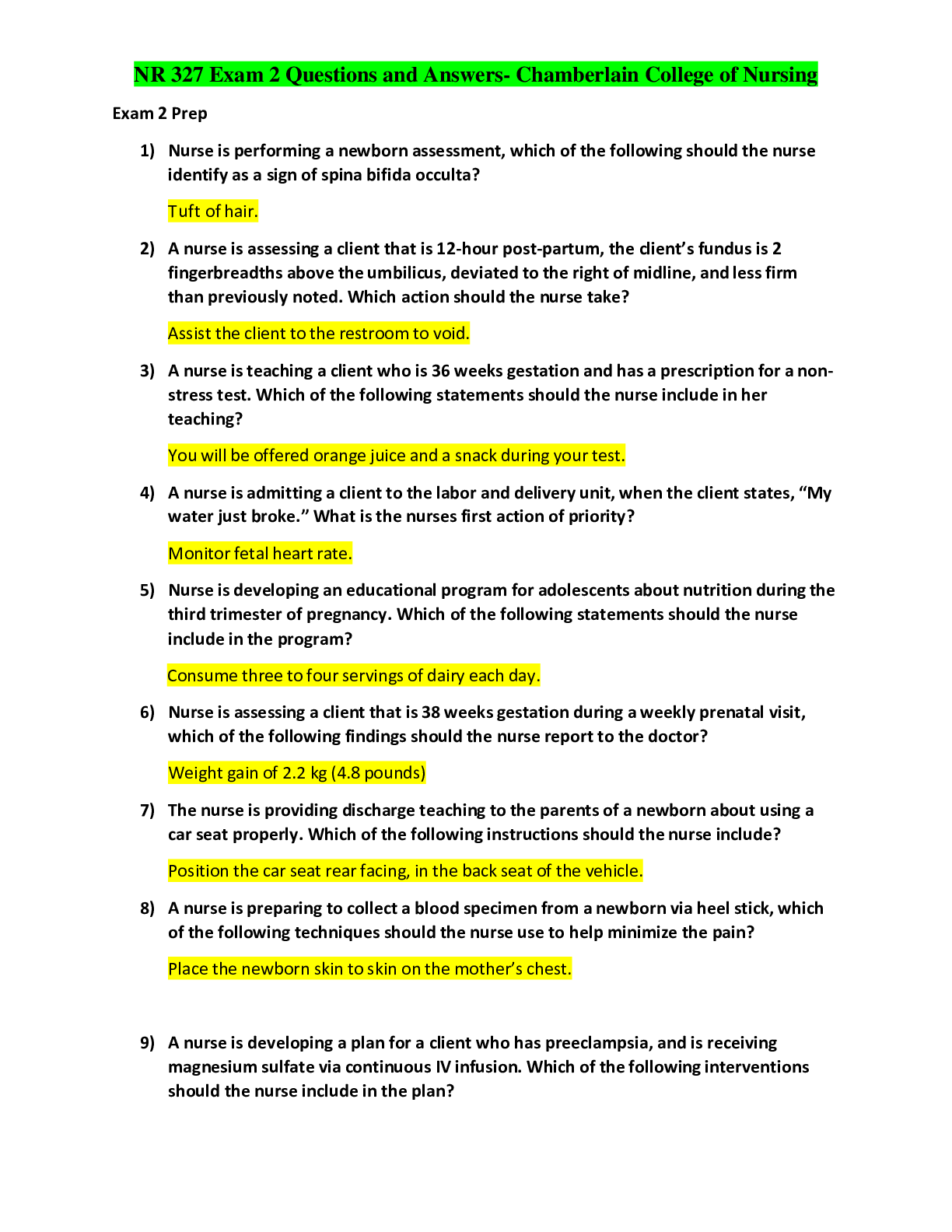

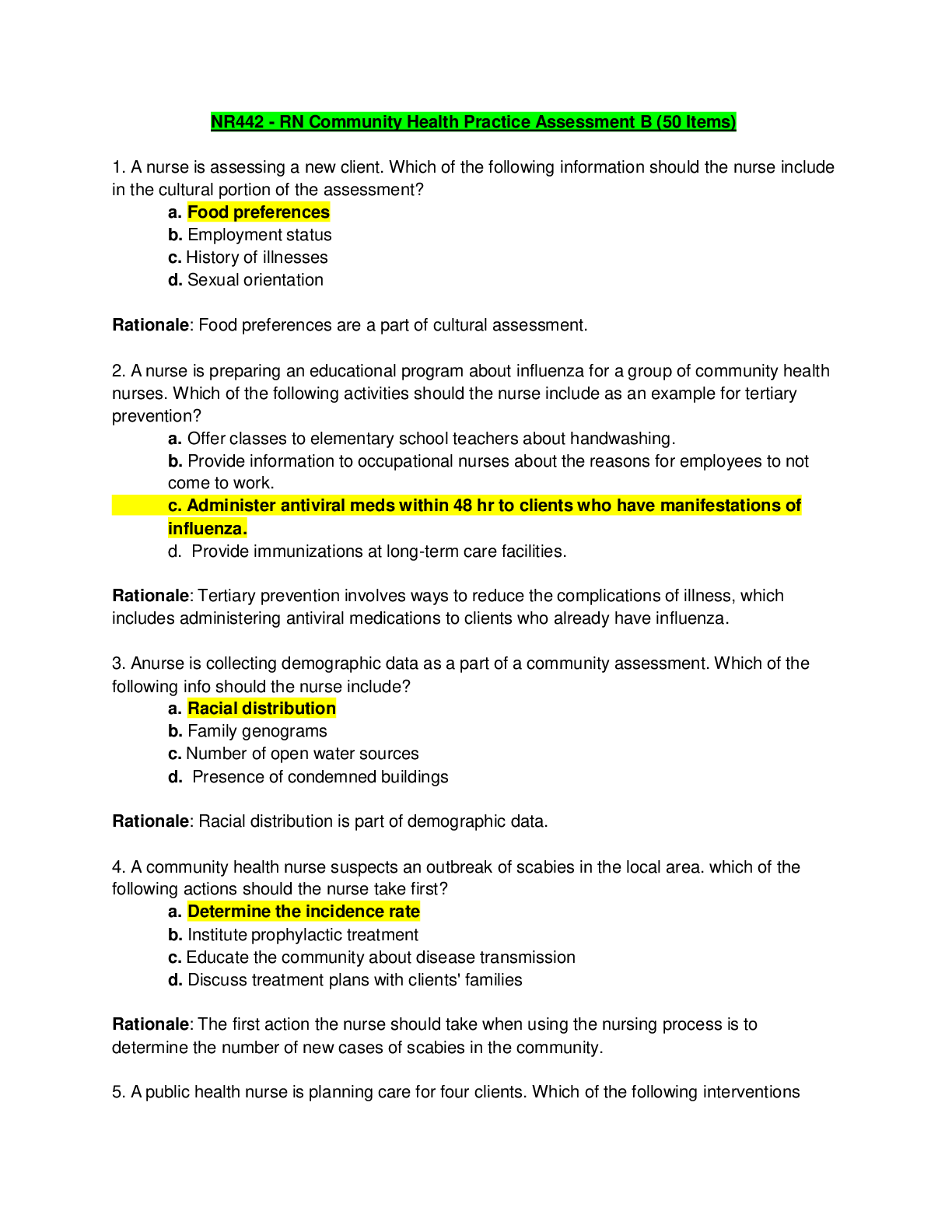
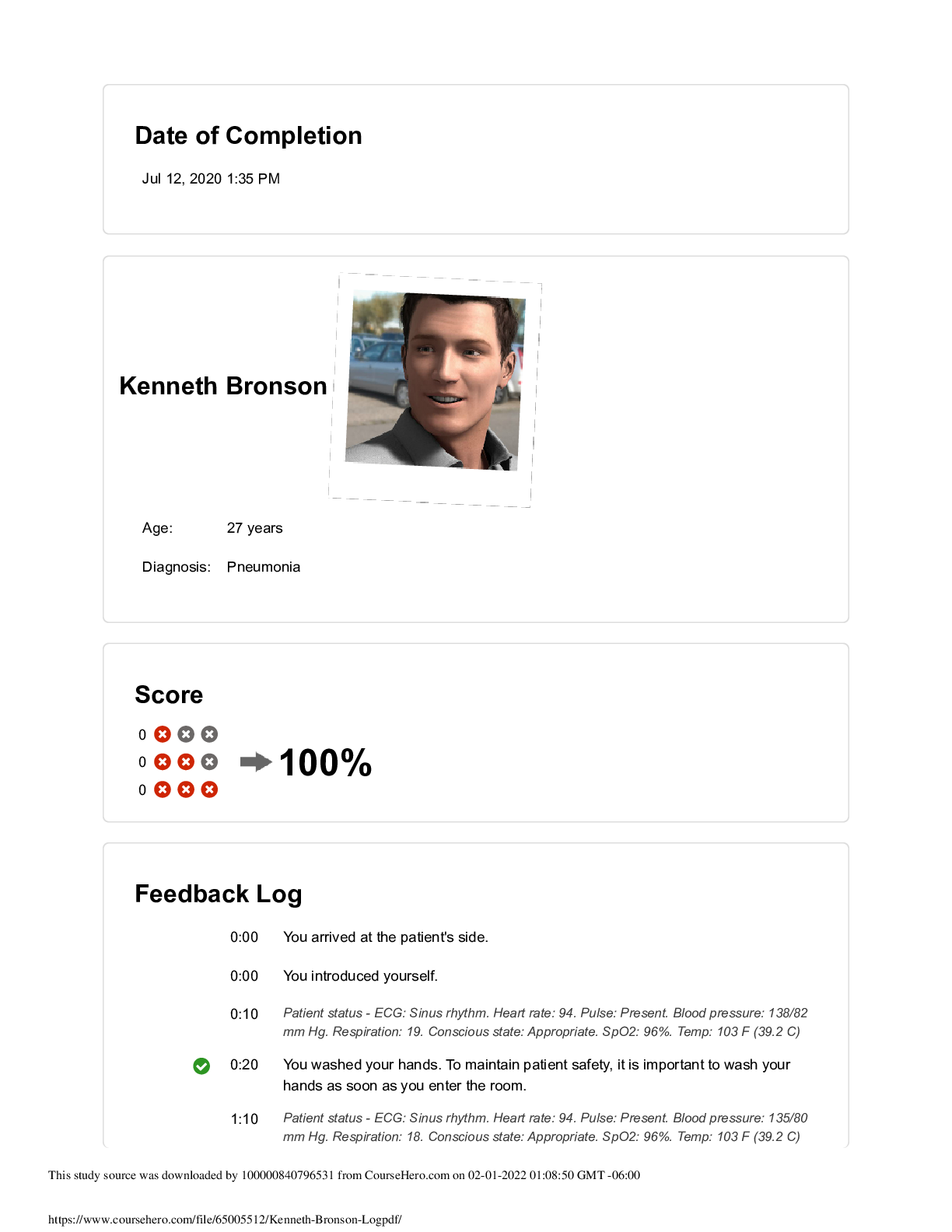

.png)
